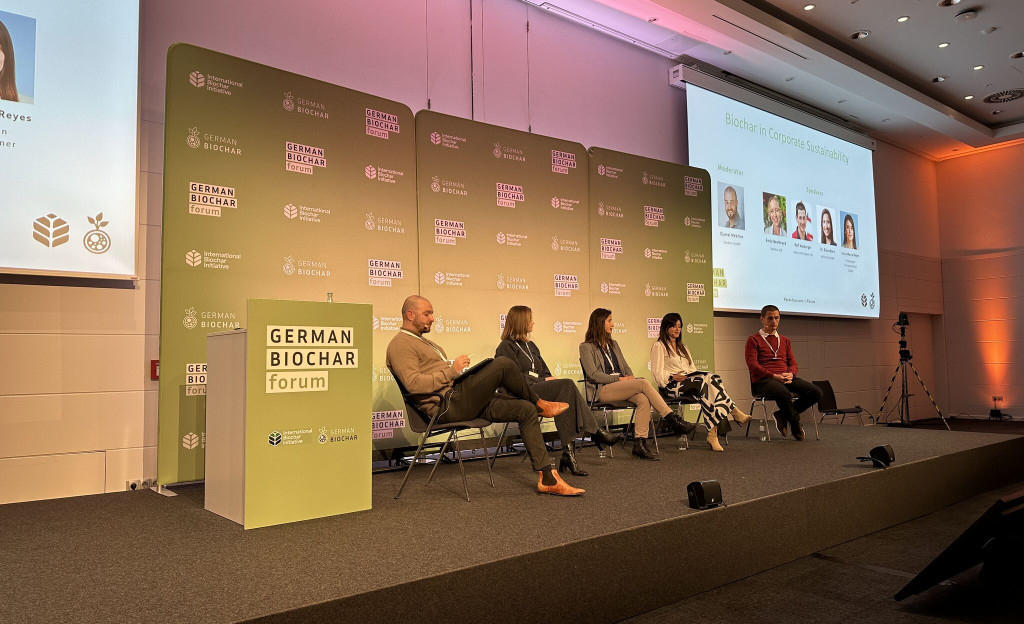Planet2050 at the German Biochar Forum, now association member!
Reading Time: 3min

The German Biochar Forum co-hosted by the German Biochar Association and the International Biochar Initiative took place in Berlin on November 18-19, 2024. Planet2050 hosted a session on the challenges associated with the sourcing of biochar feedstocks.
What is exactly Biochar?
Biochar is a carbon-rich material produced by heating organic biomass in an oxygen-limited environment. This method transforms organic materials into a stable form of carbon that resists decomposition and offers numerous environmental and agricultural benefits.

Black Gold Rush: Transforming Agriculture and Climate Mitigation
In 2024, the global biochar market reached 2.1 billion €, with projections estimating an increase to 6.1 billion € by 2033, reflecting CAGR of 10.93% during 2025-2033.
Biochar is a popular Carbon Dioxide Removal (CDR) method in the voluntary carbon market, with international carbon standards and registries such as Puro.Earth, CSI, Riverse.
It provides an additional, permanent, high-integrity solution to capture CO2 and avoid methane emissions from decomposing biomass, activities which Net-Zero companies can integrate in their strategy to neutralize residual emissions.
Production Methods of Biochar
🔥 Pyrolysis: Heating organic materials between 300°C and 700°C without oxygen, producing biochar, bio-oil, and syngas.
🌡️ Gasification: Partial oxidation of biomass at over 700°C for syngas production, with biochar as a byproduct.
💧 Hydrothermal Carbonization (HTC): Processing wet biomass at 180°C to 250°C under high pressure, ideal for high moisture feedstocks.
Beyond Carbon Storage:
Biochar provides benefits in multiple areas of application:
Agriculture: Enhances soil fertility, improves water retention, and boosts microbial health
Environmental Remediation: Binds heavy metals and pollutants, purifying soil and water
Industrial Use: Can be added to concrete and asphalt to reduce embodied emissions, used in waste treatment and water filtration or in other applications.
Biochar, Pyrolysis, and the Future of Sustainable Value Chains at the German Biochar Forum
The German Biochar Forum was a hub of innovation and collaboration, a month just after Denmark announced its Pyrolysis strategy - a whooping 1.35 billion € investment to promote the adoption of biochar in agriculture, hoping to cut down approximately 1.8 million tonnes of carbon dioxide by 2030.
What resonated deeply with us was Dr. Diana Born’s ideology: “Value creating value chains!” It is a reminder that sustainability isn’t just about emissions reductions; it’s about creating systems where every link adds tangible value.
From the use of Biochar by German municipalities, the development of standards such as BISKO and the upcoming GHP Protocol Land Sector and Removals Guidance, to the possible inclusion of Biochar CDR in the EU ETS, the Forum was rich is discussions and learnings.
Session Highlights: "Push and Pull on Sustainable Feedstock"
We are grateful to Dr. Nikolas Hagemann from the Ithaka Institute for moderating Planet2050's Barcamp discussion on “Push and Pull on Sustainable Feedstock.”
As the bioeconomy takes center stage, sustainable feedstock will play a crucial role as the point of origin for value creation. Feedstock selection is indeed key to ensure sustainable sourcing and avoid contamination, as harmful substances in biomass can lead to polluted biochar.
However, challenges remain. Sourcing feedstocks can be a complex as market and logistics are often not organized. Regulations are also evolving and strengthening the cascading principle which aims to achieve optimal resource efficiency of biomass according to its highest economic and environmental added value, which may challenge some biomass sources of European biochar projects.
GHG Protocol Land Sector and Removals Guidance
The GHG Protocol Land Sector and Removals Guidance, set to release in Q1 2025, will provide essential methods for companies to report GHG emissions and removals from land use, biogenic products, and carbon removal technologies—a significant step forward for the sector.
Planet2050 now member of the German Biochar Association
The association has been created in 2017 and is a key ecosystem builder and partner science, practice, technical plant developers and political decision-makers. We are excited to be now part of it!

Oneza Zaim with Leopold Steinbeis from German Biochar e.V.
At Planet2050, we are committed to scaling Biochar markets particularly in emerging markets.
Let’s collaborate on advancing biochar and other sustainable solutions—together, we can transform challenges into opportunities for a better future.
Learn more:
Planet2050's newsletter